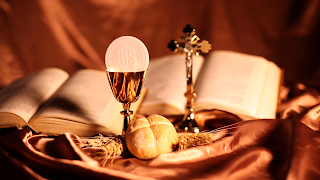The Communion Rite
To prepare for the paschal meal, to welcome the Lord, we pray for forgiveness and exchange a sign of peace. Before eating Christ's Body and drinking his Blood, we must be one with him and with all our brothers and sisters in the Church.
THE LORDE'S PRAYER
Priest: At the Saviour's command and formed by divine teaching, we dare to say:
Priest and People:
Our Father, who art in heaven,
hallowed by thy name;
thy kingdom come;
thy will be done
on earth as it is in heaven.
Give us this day our daily bread,
and forgive us our trespasses,
as we forgive those who trespass against us;
and lead us not into temptation,
but deliver us from evil.
Eucharist
The Sacrament Of The Eucharist
Catechism-1324: The Eucharist is "the source and summit of the Christian life"
What Is This Sacrament Called?
Catechism-1328: EUCHARIST
because it is an action of thanksgiving to God.
Catechism-1329: THE LORD'S SUPPER
because of its connection with the supper which the Lord took with his disciples on the eve of his Passion and because it anticipates the wedding feast of the Lamb in the heavenly Jerusalem.
Catechism-1330: THE MEMORIAL OF THE LORD'S PASSION AND RESURRECTION
The Holy Sacrifice, because it makes present the one sacrifice of Christ the Savior and includes the Church's offering.
HOLY SACRIFICE OF THE MASS
"sacrifice of praise," spiritual sacrifice, pure and holy sacrifice are also used since it completes and surpasses all sacrifices of the Old Covenant.
BLESSED SACRAMENT
because it is the Sacrament of sacraments.
Catechism-1331: HOLY COMMUNION
because by this sacrament we unite ourselves to Christ, who makes us shares in his Body and Blood to form a single Body, the body of Christ.
Catechism--1332: HOLY MASS
because of the liturgy in which the mystery of salvation is accomplished concludes with the sending forth of the faithful, so that they may fulfil God's will in their daily lives.
John 6:48-56
I am the bread of life. ...This is the bread that comes down from heaven, so that one may eat of it and not die. I am the living bread that came down from heaven. Whoever eats of this bread will live forever: and the bread that I will give for the life of the world is my flesh. " The Jews then disputed among themselves, saying "How can this man give us his flesh to eat?" So Jesus said to them, "Very truly, I tell you, unless you eat the flesh of the Son of Man and drink his blood, you have no life in you. Those who eat my flesh and drink my blood have eternal life, and I will raise them up on the last day; for my flesh is true food and drink my blood abide in me, and I in them.
عشای ربانی
عشای رَبّانی یا شام خداوند یا آیین سپاسگزاری یکی از هفتآیین مقدس (هفتراز) است که تقریباً در تمام فرقههای مسیحیت به انجام میرسد. به آن تقسیم مقدس (Holy Communion)، راز محراب (the Sacrament of the Altar)، راز خجسته (Blessed Sacrament) هم گفته شدهاست.
شیوه اجرای این آیین در میان فرقههای مختلف مسیحیان اندکی متفاوت است، اما چند مسئله در میان تمام فرقهها مشترک میباشد.
منشا این آیین به آخرین شامی بازمیگردد که عیسی مسیح در شب دستگیری خود توسط سربازان رومی با حواریون خود خورد. از آنجا که سرشت او با سرشت «خداوند» یکی است، وی از جریان کامل خیانت «یهودا اسخریوطی» به خود، دستگیریاش و در نهایت قربانی شدنش از طریق مصلوب شدن برای گناهان نوع بشر با خبر بود. به همین خاطر مراسم این شام (که به «شام آخر» معروف است) محل آخرین و مهمترین آموزههای مسیح شد.
در انجیل متی فصل ۲۶ آیات ۲۶تا۲۸ چنین آمده است:
چون هنوز مشغول خوردن بودند، عیسی نان را برگرفت و پس از شکرگزاری، پاره کرد و به شاگردان داد و فرمود: «بگیرید، بخورید؛ این است بدن من.» سپس جام را برگرفت و پس از شکرگزاری آن را به شاگردان داد و گفت: «همهٔ شما از این بنوشید. این است خون من برای عهد [جدید] که بهخاطر بسیاری بهجهت آمرزش گناهان ریخته میشود.
زمان این مراسم، در شب عید «پِسَح» (عید فطیر) یهودیان بود.
در شاخهٔ کاتولیک این باور وجود دارد که نان و شراب اجزای اصلی عشای ربانیاند و با سخنان مسیح و استمداد از روحالقدس حقیقتاً تبدیل به جسم و خون عیسی میشوند. نان و شراب در خلال مراسم عشای ربانی، ماهیت وجودی و مفهوم طبیعی خود را به عنوان غذای جسم از دست میدهند و ماهیت معنایی جدیدی مییابند. آنها اکنون نشانههای واقعیت یافتهای از حضور شخصی و تقدیم خود از سوی عیسی مسیح هستند.این آموزه یعنی تبدیل نان و شراب توسط دعای کشیش به بدن و خون مسیح را اصطلاحاً «تبدّل جوهر» مینامند. همچنین بنا بر سنت کلیسای کاتولیک، این آیین هر یکشنبه در کلیسا برگزار میشود.
از ویکیپدیا، دانشنامهٔ آزاد
Subscribe to:
Comments (Atom)


